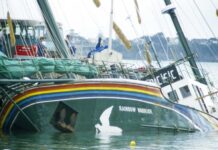
Waiheke and the Hauraki Gulf have been declared New Zealand’s first TPPA free zone.
Waiheke Local Board members voted unanimously last Thursday night for the island to adopt a stance of resistance against the Trans Pacific Partnership Agreement until the effects on local government decision-making and New Zealand’s sovereignty can be independently evaluated.
Local board member Shirin Brown initiated the move for Waiheke to become TPPA free, and was pleased to see about 30 people attend the board meeting last week to debate the issue.
While most of those attending supported Waiheke adopting a TPPA free stance, a couple were opposed to the idea.
“Becoming TPPA free is a symbolic gesture that sends a clear message to the government that there is no social mandate for signing this agreement.
“The government makes decisions on behalf of the people, but often people are severely affected by decisions they have not been included in making.
“The vote by the local board sends a clear signal that we want more information about the TPPA before it’s signed,” says Ms Brown.
The TPPA is likely to benefit big businesses and multi-national corporations, but could have a devastating effect on small local businesses, and diminish the power of governments and local bodies to make independent decisions on issues such as public policy and environmental protection, she says.
The TPPA could determine whether national laws and local bylaws can be made and allow companies to sue governments for breaching the trade agreement, she says.
If the government signs the TPPA, New Zealand’s decision-making bodies could lose the power to protect public health and safety, particularly in relation to restrictions on products such as alcohol and tobacco, says Ms Brown.
Both central and local governments could be forced to change laws and bylaws to meet the requirements of the TPPA and carry the costs for ensuring compliance with the international agreement.
“We would be neglecting our responsibilities as local board members if we didn’t speak out about the potentially damaging effects this agreement will have on local government decision making. Until independent research has been commissioned and debated publicly and in parliament, it would be foolhardy for central government to lock us into an agreement which is likely to cost us more than it benefits us,” says Ms Brown.
It would be foolhardy for central government to lock us into an agreement which is likely to cost us more than it benefits us.
– Shirin Brown
Most of Waiheke’s industry involves small businesses which could be threatened by increased regulation costs introduced by the TPPA, she says.
Several iwi groups have raised concerns about the effect of the TPPA on Maori and Treaty of Waitangi issues while a wide range of other groups have voiced doubts about the agreement.
In the 1970s Waiheke was the first place in New Zealand to go nuclear free, and the island broke new ground by becoming a genetic engineering free zone in the 1990s.
“We’ve got a history of thinking for ourselves and making conscious decisions about what we want for our society – that’s what I love about being on Waiheke,” says Ms Brown.
Local Board member John Meeuwsen seconded the motion for Waiheke to become TPPA free.
He highlighted concerns that the TPPA could impact on employment issues and intellectual property rights.
A protest march up Queen Street will take place from Aotea Square in Auckland city starting at 12pm today, 4 February, when trade ministers from around the Pacific are expected to sign the TPPA at SkyCity. The signing is part of the agreement process and will not finalise the deal, which will continue to be negotiated.
More than 49,000 people have signed a petition on www.actionstation.org.nz stating that they do not consent to the trade agreement.
• Rose Davis






